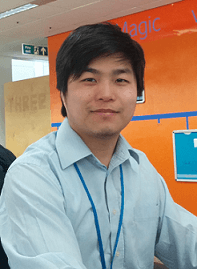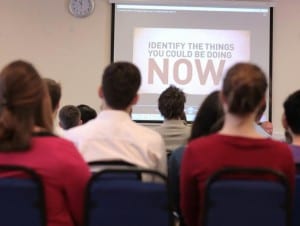Alice Lui’s Festival Experience at Science Museum
By Weronika Z Benning, on 30 April 2016
Internships, placements, work shadowing….when it comes to selecting a career they’re all great ways to ‘try before you buy’. Some UCL PhD programmes contain a mandatory placement period, a few months where students must do something unrelated to their research. These prove invaluable to the students involved, so in this UCL Careers Researchers series of posts we hope to spread the career knowledge by speaking to three PhDs about their placement experiences.
Interview by Shadae Samuels, Placements and Vacancies Officer, UCL Careers.
Image taken from Allan Watt.
Alice Lui is a current PhD student with the London Interdisciplinary Doctoral Training Programme; based in Saul Purton’s lab her PhD project is studying the synthesis of fungible biofuels in cyanobacteria. Alice initially wanted to gain experience in science communications to reach the wider public beyond academia. The placement team brokered a relationship with the Science Museum who offered exclusive roles to PIPS students, one of which was the chance to work at one of their upcoming festivals. This was the perfect opportunity for Alice to gain experience in science communication to a wider audience, she applied and was offered the position after having an interview. She was supervised by the Assistant Content Developer, Pippa Hough.
How did Alice secure her placement with Science Museum?
The placements team was aware that Science Museum were interested in taking on UCL students as interns so we got in touch and informed them of BBSRC/LIDo programme. They were keen to host such students on a placement and offered two exclusive PIPS opportunities, Alice sent her CV and cover letter to Science Museum, and she was then invited to an interview and then offered the position to begin shortly after.
What was The Science Museum looking for in their placement student?
The Science Museum wanted a student who would be able to work to tight deadlines, has excellent research skills, and would be able to handle a lot of changes! Alice’s expertise in synthetic biology and bio-sciences in general really stood out in her application/interview as this would be helpful in translating complicated research papers.
What did Alice do on her placement?
The main focus of Alice’s placement was to research and develop the scientific content for the ‘You Have Been Upgraded’ festival on the topic of human enhancement technologies. Her time was spent mostly on researching the area of human enhancement and synthetic biology. She contacted academics, artists and individuals involved in this area of research and interviewed them about their work and whether they would be interested in being involved in the festival. Alice also researched possible demonstrations that could be shown during the festival. During the week leading up to the festival, Alice helped with setting up the festival space. During the festival Alice supported the scientists and interacted with the public, she was also responsible for researching possible objects that could feature in the museum.
What did Alice gain from the experience?
The main thing Alice gained from her placement was the confidence to communicate! She improved on her communication skills as she was communicating with people outside the industry and therefore had to learn how to engage a lay audience. This was extremely valuable to her especially if she decides to embark on a career outside of academia. Alice learned the importance of being organised which improved her time management skills.
How did the placement contribute to The Science Museum?
Alice’s ability to think fast on her feet and problem solve on the go really helped the festival run as smoothly as it did. Alice also did general research around contemporary science topics that fed into events and small exhibitions the department produces. Her work on finding an object to represent a case on Ebola was particularly helpful! Overall she proved how valuable it is to have an intern which is something the team has not done before and there are excited to have their next LIDo intern.
Did the placement influence Alice’s career plans?
Although Alice is still uncertain about her future job prospects the placement has made Alice realise how important job satisfaction and your wellbeing is. She is therefore considering different types of opportunities. Alice may consider a role in Science Communication following her PhD as she gained a lot of confidence in communicating with a wider audience.
If you’re a UCL PhD or researcher wondering how to secure work experience or a more permanent post, book an appointment to speak with one of our advisers. And for advertised opportunities check out UCL Talent Bank and JobOnline.
 Close
Close






 Durgha Ramji (25) is Inme’s very own ambitious young person from the UK. Durgha spent her first year at UCL before transferring to the University of London Institute in Paris. Durgha has interned at the Foreign and Commonwealth Office, the Sharekh Youth Forum in the Palestinian Territories and the Next Billion Online project powered by Google in Bangalore, India. She now heads Inme’s engagement with the outward student mobility strategy of UK HE Institutions.
Durgha Ramji (25) is Inme’s very own ambitious young person from the UK. Durgha spent her first year at UCL before transferring to the University of London Institute in Paris. Durgha has interned at the Foreign and Commonwealth Office, the Sharekh Youth Forum in the Palestinian Territories and the Next Billion Online project powered by Google in Bangalore, India. She now heads Inme’s engagement with the outward student mobility strategy of UK HE Institutions.

